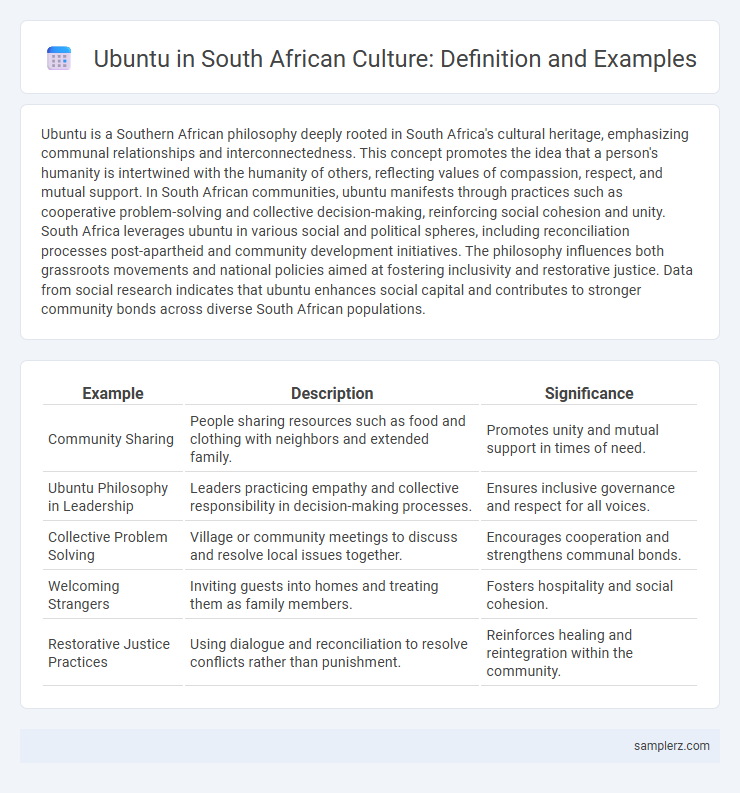Ubuntu is a Southern African philosophy deeply rooted in South Africa's cultural heritage, emphasizing communal relationships and interconnectedness. This concept promotes the idea that a person's humanity is intertwined with the humanity of others, reflecting values of compassion, respect, and mutual support. In South African communities, ubuntu manifests through practices such as cooperative problem-solving and collective decision-making, reinforcing social cohesion and unity. South Africa leverages ubuntu in various social and political spheres, including reconciliation processes post-apartheid and community development initiatives. The philosophy influences both grassroots movements and national policies aimed at fostering inclusivity and restorative justice. Data from social research indicates that ubuntu enhances social capital and contributes to stronger community bonds across diverse South African populations.
Table of Comparison
| Example | Description | Significance |
|---|---|---|
| Community Sharing | People sharing resources such as food and clothing with neighbors and extended family. | Promotes unity and mutual support in times of need. |
| Ubuntu Philosophy in Leadership | Leaders practicing empathy and collective responsibility in decision-making processes. | Ensures inclusive governance and respect for all voices. |
| Collective Problem Solving | Village or community meetings to discuss and resolve local issues together. | Encourages cooperation and strengthens communal bonds. |
| Welcoming Strangers | Inviting guests into homes and treating them as family members. | Fosters hospitality and social cohesion. |
| Restorative Justice Practices | Using dialogue and reconciliation to resolve conflicts rather than punishment. | Reinforces healing and reintegration within the community. |
Introduction to Ubuntu Philosophy in South Africa
Ubuntu, a fundamental philosophy in South African culture, emphasizes interconnectedness, community, and mutual respect, encapsulated in the phrase "I am because we are." Rooted in indigenous Bantu languages, Ubuntu promotes shared humanity and social cohesion, guiding ethical behavior and conflict resolution. This philosophy has shaped social interactions, leadership approaches, and reconciliation efforts, particularly post-apartheid.
Historical Roots of Ubuntu in South African Culture
Ubuntu, a foundational philosophy in South African culture, originates from the Nguni Bantu languages and embodies the principle of shared humanity and interconnectedness. Historically, ubuntu guided communal living and social harmony in pre-colonial societies, emphasizing collective responsibility and mutual care. This philosophy continues to influence modern South African social values, promoting reconciliation and unity post-apartheid.
Ubuntu and Community Spirit: Real-Life Examples
Ubuntu in South Africa exemplifies a profound sense of community spirit, emphasizing interconnectedness and mutual support. In rural villages, neighbors frequently collaborate on farming activities and share resources, reinforcing social cohesion and collective well-being. Community initiatives, such as cooperative businesses and shared childcare programs, showcase Ubuntu's practical application in fostering unity and resilience.
Ubuntu in South African Education Systems
Ubuntu in South African education systems promotes community, respect, and interconnectedness among students and teachers, fostering collaborative learning environments that enhance social cohesion. This philosophy encourages holistic development, emphasizing empathy, shared responsibility, and collective success, which are integrated into curricula and school governance. Ubuntu's influence helps bridge cultural divides and supports inclusive education policies, reinforcing values essential for nation-building and social harmony.
Ubuntu’s Influence on Reconciliation and Nation-Building
Ubuntu, a Southern African philosophy emphasizing humanity, compassion, and interconnectedness, plays a crucial role in South Africa's reconciliation and nation-building efforts. Rooted in the Nguni Bantu term meaning "I am because we are," Ubuntu fosters community healing by promoting forgiveness and mutual respect after apartheid. This cultural framework has been instrumental in shaping initiatives like the Truth and Reconciliation Commission, facilitating social cohesion and collective identity in a diverse society.
Ubuntu Practices in South African Workplaces
Ubuntu practices in South African workplaces emphasize collective support, mutual respect, and shared responsibility among employees, fostering a strong sense of community and collaboration. This philosophy encourages inclusive decision-making, conflict resolution through empathy, and prioritizing group harmony over individual achievement. Organizations integrating Ubuntu principles often experience enhanced teamwork, improved morale, and a more cohesive work environment.
Ubuntu and Social Welfare Initiatives
Ubuntu in South Africa embodies a philosophy of communal support and shared humanity, deeply influencing social welfare initiatives across the country. Community-driven programs inspired by Ubuntu prioritize collective well-being, fostering cooperation in healthcare, education, and poverty alleviation projects. This approach strengthens social cohesion by emphasizing interconnectedness and mutual responsibility among individuals and groups.
Ubuntu in Traditional Ceremonies and Daily Life
Ubuntu in South Africa deeply influences traditional ceremonies, emphasizing communal values of compassion, respect, and interconnectedness during rituals such as weddings, funerals, and harvest celebrations. Daily life reflects Ubuntu through practices of mutual aid, shared responsibilities, and collective decision-making within families and communities. This philosophy fosters social cohesion and reinforces a strong sense of identity and belonging among South Africans.
Ubuntu’s Role in Conflict Resolution
Ubuntu in South Africa plays a crucial role in conflict resolution by emphasizing community interconnectedness and mutual respect, fostering restorative justice rather than punitive measures. This philosophy promotes dialogue and reconciliation, helping to heal divisions caused by historical and social conflicts such as apartheid. Through ubuntu, communities actively engage in resolving disputes by prioritizing harmony and collective well-being over individual gain.
Global Impact of South African Ubuntu
Ubuntu, a Southern African philosophy emphasizing communal interdependence and human dignity, has significantly influenced global discourses on social justice and ethical leadership. South Africa's adoption of ubuntu principles during the post-apartheid era inspired international frameworks promoting reconciliation, inclusion, and conflict resolution. The global impact of South African ubuntu is evident in diverse fields such as restorative justice, corporate social responsibility, and community development initiatives worldwide.

example of **ubuntu** in **South Africa** Infographic
 samplerz.com
samplerz.com